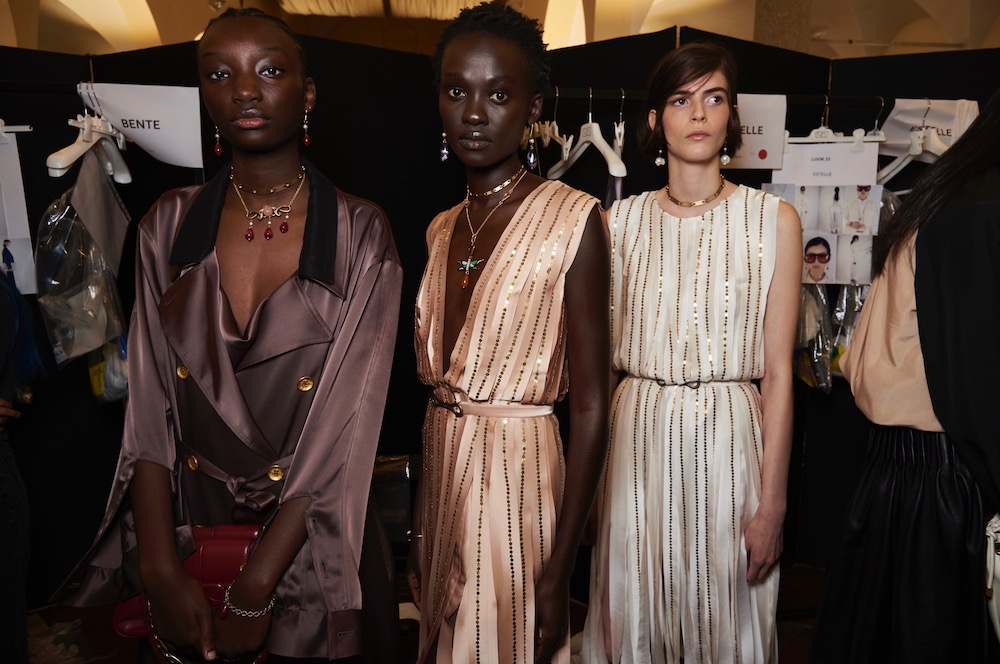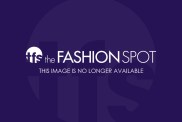We knew pulling off fashion weeks in New York, London, Milan and Paris would be tough during a pandemic. With safety protocols and alternative showcases like lookbooks and videos, the fashion world managed to get it done. Now the diversity numbers are in and, frankly, they’re not great. A bit surprising given all the calls for equality in the industry. But we’d be remiss if we didn’t acknowledge the ongoing health crisis as a contributing factor. Not that it excuses the lack of any real progress on all the diversity fronts. We can and must do better.
RACE
First, let’s give credit where credit is due. The Spring 2021 season saw a very slight increase in the number of nonwhite model appearances. It went up from 40.6 percent in Fall 2020 to 41.3 percent this time around. In other words, less than one percentage point. But we must look at the minor jump in context. For Fall 2020, there were 6,879 total model castings across 194 shows. This season, due to the pandemic, there were only 2,293 total model castings across 180 presentations. Which makes the small increase from last season more significant since there were less castings and fewer shows. Fashion Month Spring 2021 is actually now the second most diverse season ever following a history-making Spring 2020 season that boasts 41.5 percent models of color (out of 7,390 model castings at 215 major shows).
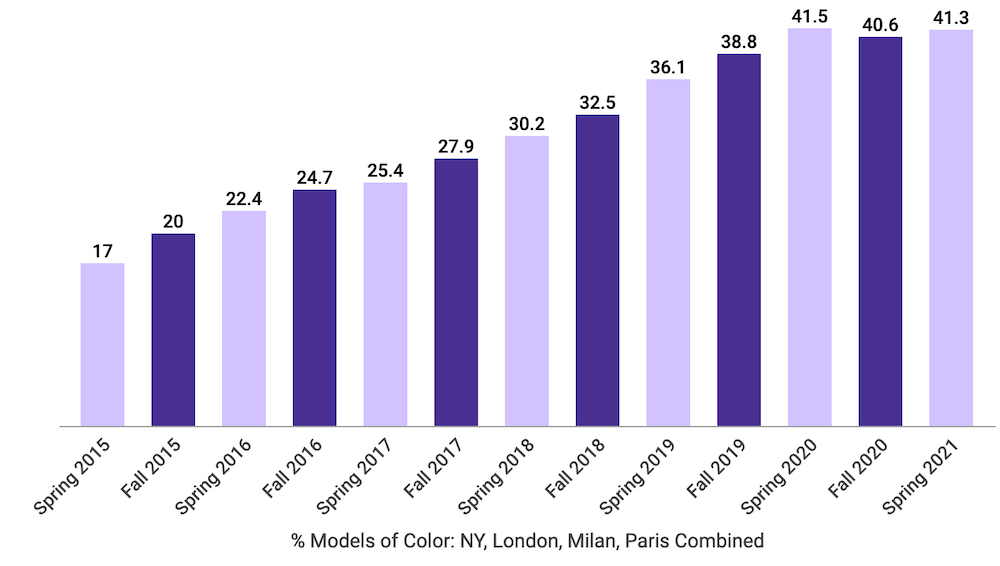
If you break things down by city, New York had the highest rate of models of color at 57.1 percent. (Compare that to Fall 2020’s 43.6 percent.) Then comes London with 52 percent. London also managed to outdo itself since its Fall 2020 figure was only 43.8 percent. Paris cast 38.9 percent, leaving Milan in last place with 35.6 percent. More troubling is the fact that both Milan and Paris had lower rates than last season. Milan dropped from 36.6 percent to 35.6 percent; Paris went from 39.3 percent to 38.9 percent.
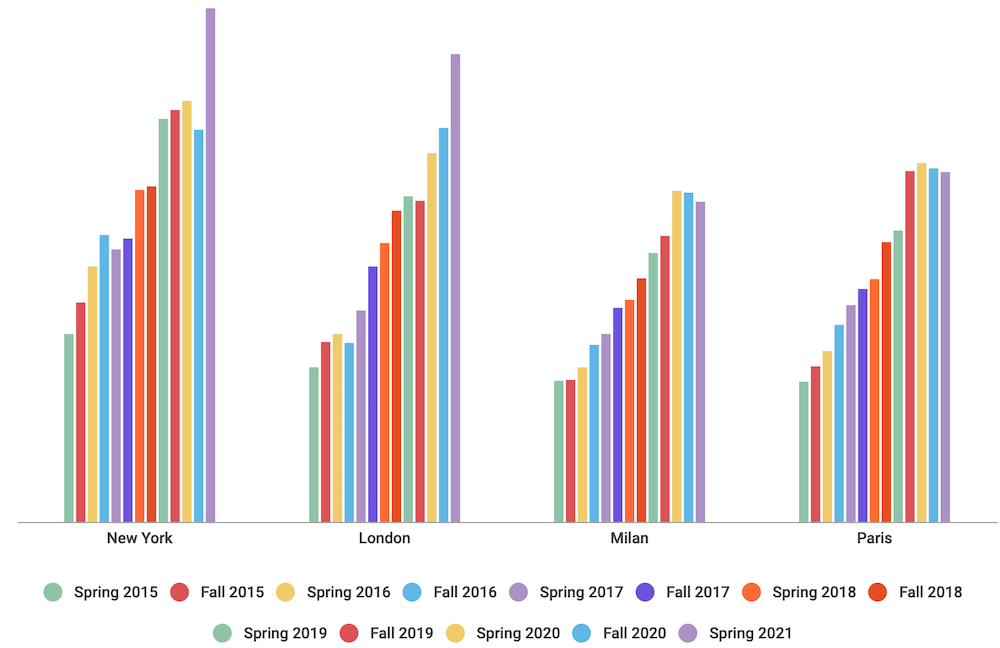
TOP MODELS
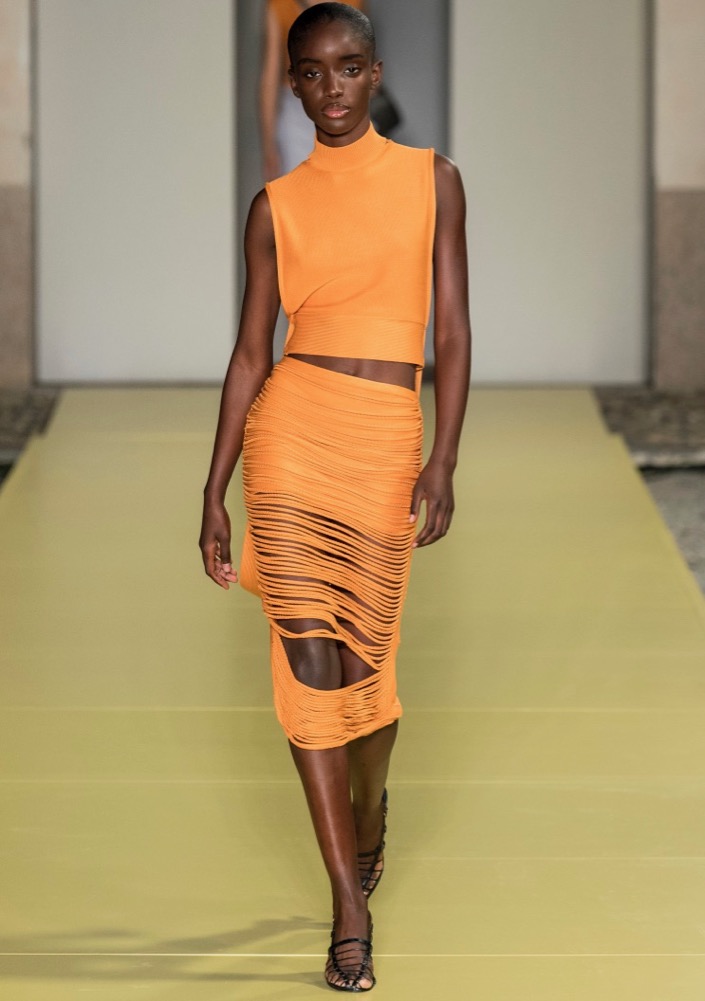
We’re happy to report that the top two models of the month are women of color. Maty Fall led the charge with an impressive 18 appearances. The Senegal born, Italy raised model appeared in some of the biggest shows of the season, too. Like Burberry, Fendi, Versace, Christian Dior, Chanel and more. Hailing from East Africa, Malika Louback was close behind with 16 appearances.
He Cong, Felice Noordhoff, Sacha Quenby, Sculy Mejia, Mika Schneider and androgynous model Miriam Sanchez all tied for third with 13 shows apiece. Rounding out the list are Valerie Scherzinger with 12, Amar Akway with 11, Lulu Tenney with 11, Mathilde Henning with 11 and Sarah Dahl with 11. When you add it all up, 7 out of the top 13 models were women of color.
Interestingly, none of the top models appeared in New York. In fact, most stuck to Milan and Paris.
PLUS-SIZE
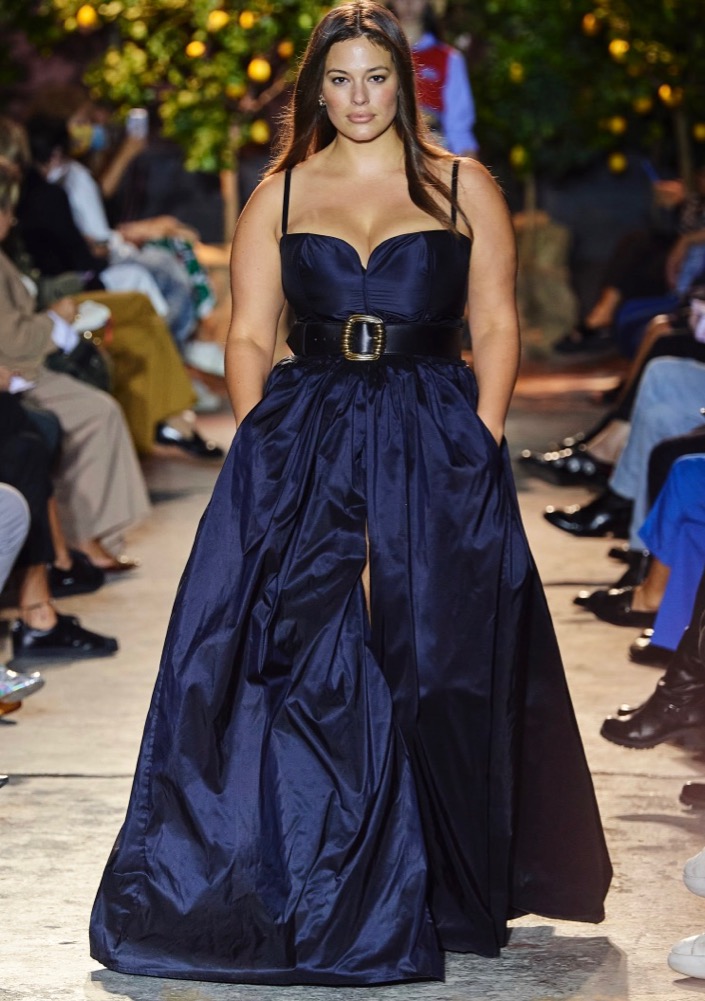
Plus-size representation plummeted this season. It went from 46 for Fall 2020 to only 34 for Spring 2021. That’s only 1.48 percent for the whole month.
Milan booked the most with 14. Followed by New York with 12, Paris with five and London had only three. In Milan, both Jill Kortleve and Paloma Elsesser appeared in three shows. The former walked for Fendi, Versace and Etro. The latter was spotted at Fendi, Marni and Salvatore Ferragamo. Ashley Graham represented both Fendi and Etro. Nathalia Novaes walked for Blumarine and DROMe. Alva Claire and Precious Lee were cast for Versace. Zinzi Fauci for Valentino and Isabelle Adams at Marni wrap things up.
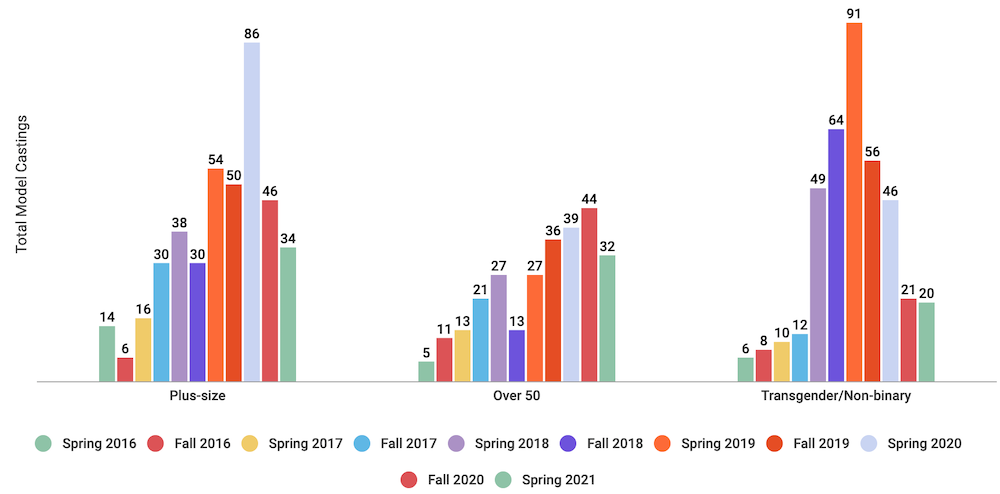
In New York, 12 appearances were spread across five shows. Claire, Kimberly Drew and Precious Okoyomon were cast by Collina Strada. Ingrid Medeiros, Kylie Frink, Lauren Chan (who also popped up at Veronica Beard) and Sabina Karlsson walked for Christian Siriano. Over at Christian Cowan it was Jari Jones and Rachel Cargle. Maya Finoh for Chromat and Elsesser for Eckhaus Latta finish off the list.
Moving on to Paris, Kortleve was at it again walking for Chanel and Coperni. Jana Plesnikova and Julia Lamarque were at Etam. Last but not least, Novaes represented Balmain.
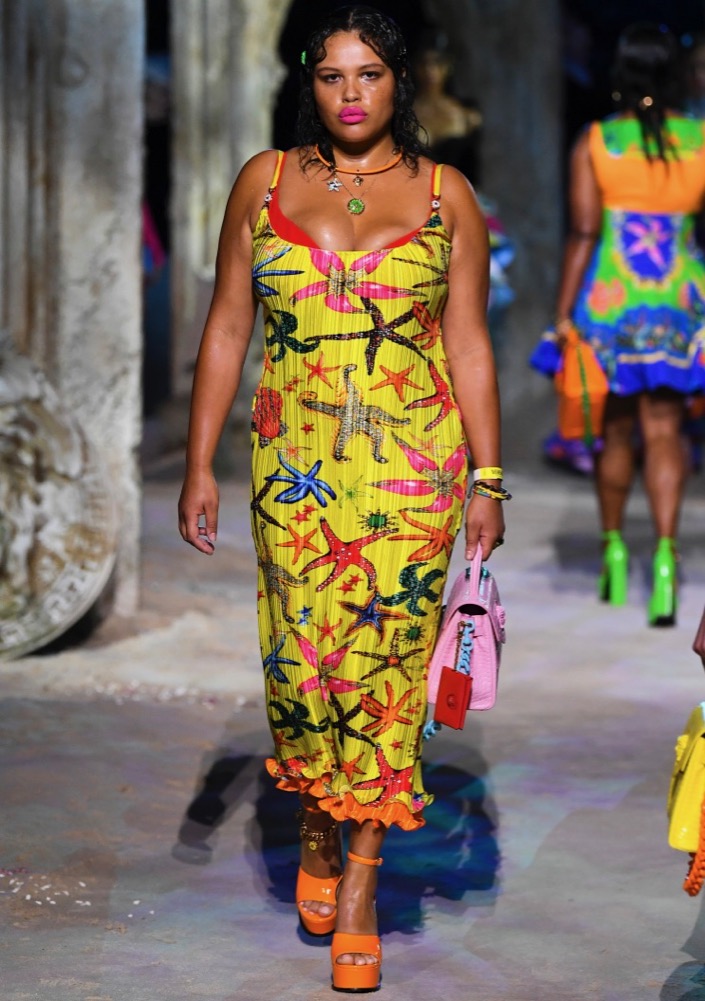
London’s three plus-size models were Tess McMillan for Simone Rocha, Jade O Belle for Gareth Pugh and Honey Ross for Roksanda.
It’s also noteworthy that 15 of Spring 2021’s plus-size castings went to women of color.
TRANSGENDER/NON-BINARY
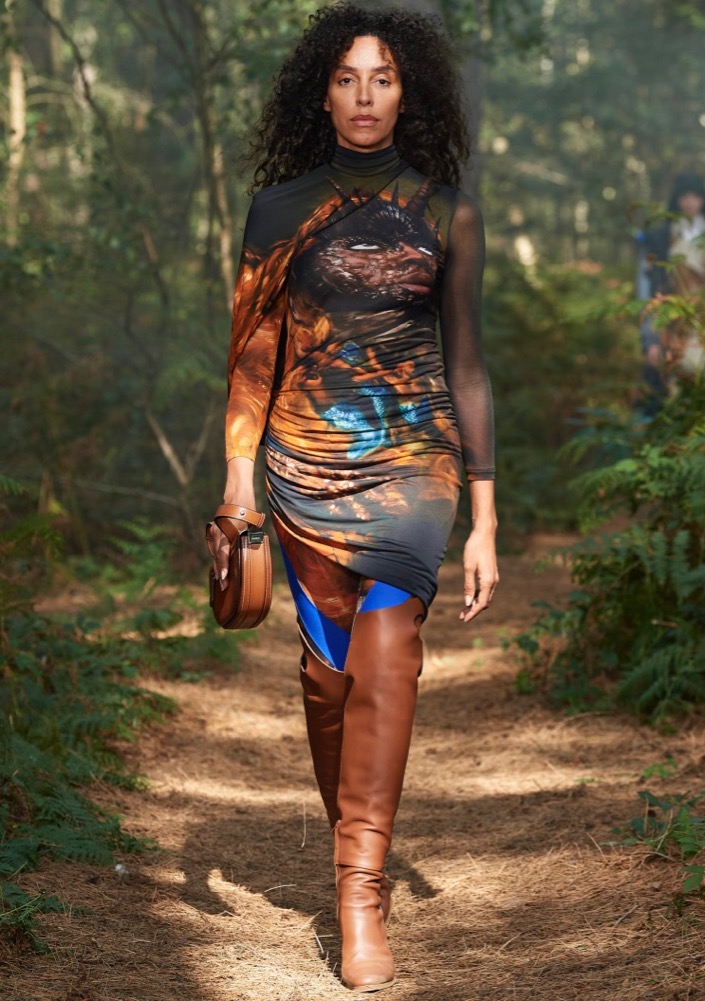
Gender diversity suffered a slight setback for Spring 2021. Only 20 appearances occurred, Fall 2020 saw 21. But both numbers are pretty paltry compared to the other fashion months. (We’re talking less than half of the last few seasons.)
Milan was the worst offender with only one casting. Transgender model Valentina Sampaio walked down Etro’s runway. Also of note is the fact that androgynous model Miriam Sanchez racked up six castings in the Italian city.
Across the pond, London saw just three castings. Gareth Pugh was responsible for two of those appearances enlisting non-binary model Finn Love and transgender model Sakeema Crook. The brand also cast drag queen Georgie Bee. Naturally, Riccardo Tisci picked his muse Lea T to walk for Burberry.
In Paris, Koché picked transgender models Dustin Muchuvitz and Venus Liuzzo. Muchuvitz also represented Paul & Joe. Balenciaga went with Gigi Hari, while Maxim Magnus hit the runway for Ralph & Russo. (Sanchez had another great showing in the City of Light racking up seven appearances.)
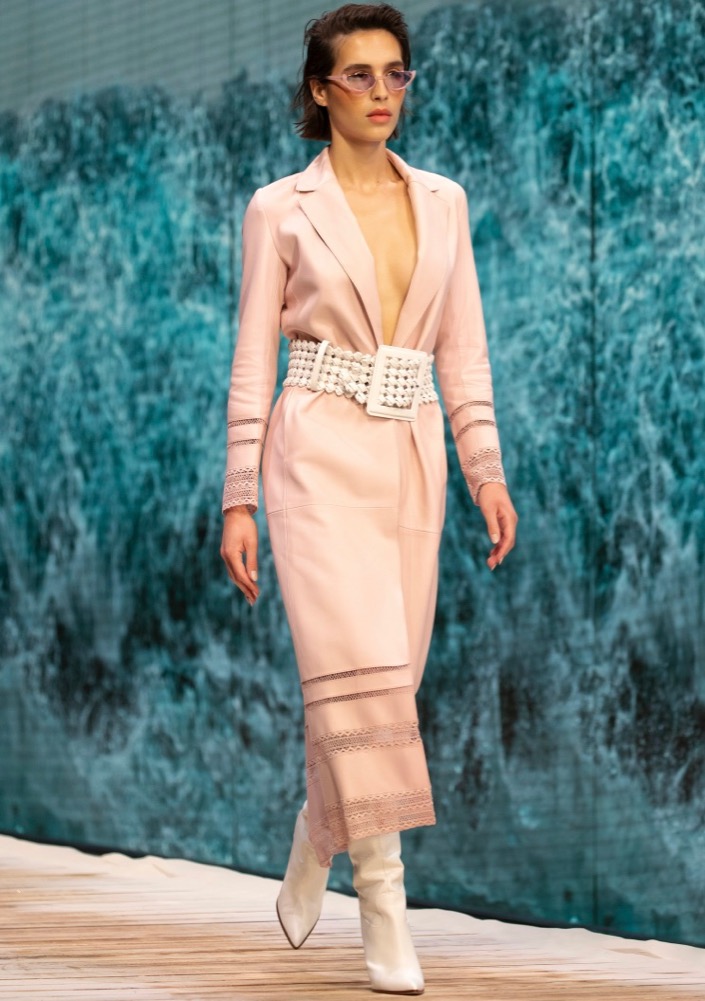
New York had far and away the most transgender/non-binary appearances with 11. Aaron Philip represented Collina Strada. Amanda Lepore, Isis King, Jari Jones and Teddy Quinlivan were hired by Christian Cowan. Jason Wu tapped Ariel Nicholson and Indya Moore. R13 enlisted Ella Snyder, Kim Shui picked Fabiana Montenegro, Eckhaus Latta had Hari Nef and Maya Mones modeled for Chromat.
Three drag queens were also booked. Christian Cowan had Symone and Violet Chachki. Collina Strada hired West Dakota. It was almost an even split between white and nonwhite models. Even more encouraging is the fact that Lepore also falls into the age category and Jones is a plus-size model.
Only nine of all castings in this category went to models of color.
AGE
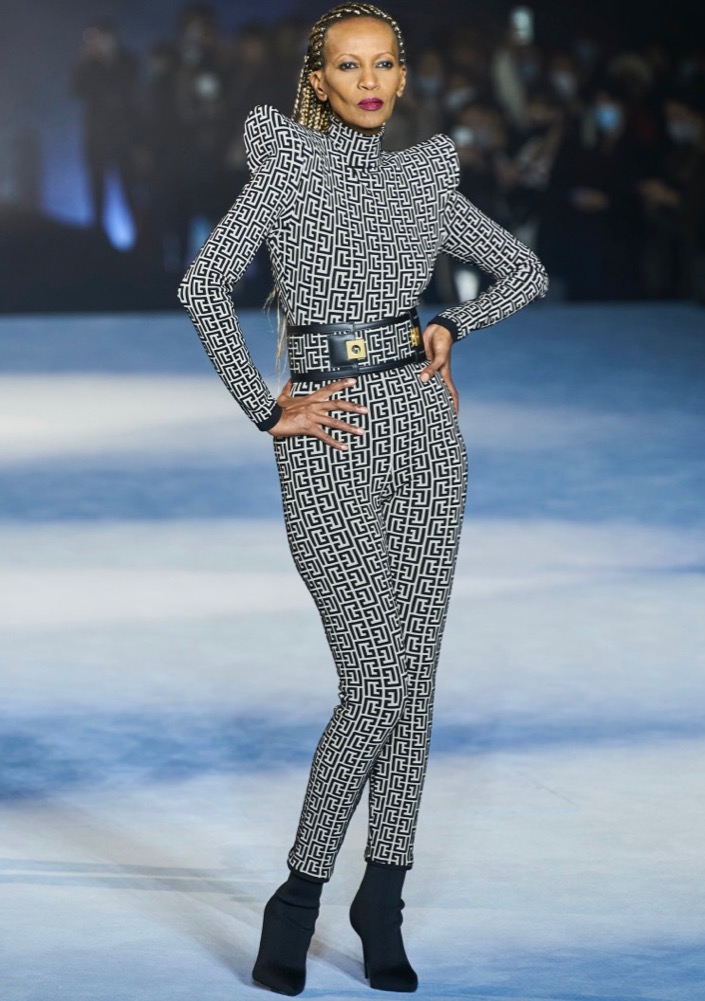
Just like with plus-size castings, bookings of models over 50 plunged. Fall 2020 saw 44, while this season dropped to 32. Paris delivered the vast majority ringing in at 20. Amalia Vairelli led the pack with four castings: Balmain, Marine Serre, Kenneth Ize and Ami. Actually, Balmain was responsible for plenty of the over 50 castings. In addition to Vairelli, the brand also selected Sonia Itchi, Axelle Doué, Charlotte Flossault and Violetta Sanchez. Another big booker? Balenciaga. The fashion house added many 50-plus models to its roster, including Minttu Vesala and Suzi de Givenchy. Hilary Lloyd and Kristina de Coninck (who also appeared for Marine Serre) represented Loewe. Ralph & Russo hired Marie Helvin, while Vivienne Westwood enlisted Sara Stockbridge and herself for Spring 2021.
New York, London and Milan all tied with four over 50 model appearances apiece. In New York, supermodel Helena Christensen modeled for Christian Cowan. As did Amanda Lepore and Susanne Bartsch. Collina Strada enlisted Kathleen Engman.
London featured Ruth Chapman for Emilia Wickstead, Wendy Freeman for Phoebe English and two 50-plus women for Roksanda. In Milan, Fendi gave us three out of that city’s four castings. Cecilia Chancellor, Penelope Tree and Yasmin Le Bon all walked for the fashion house. Meanwhile, Benedetta Barzini was picked by Daniela Gregis.
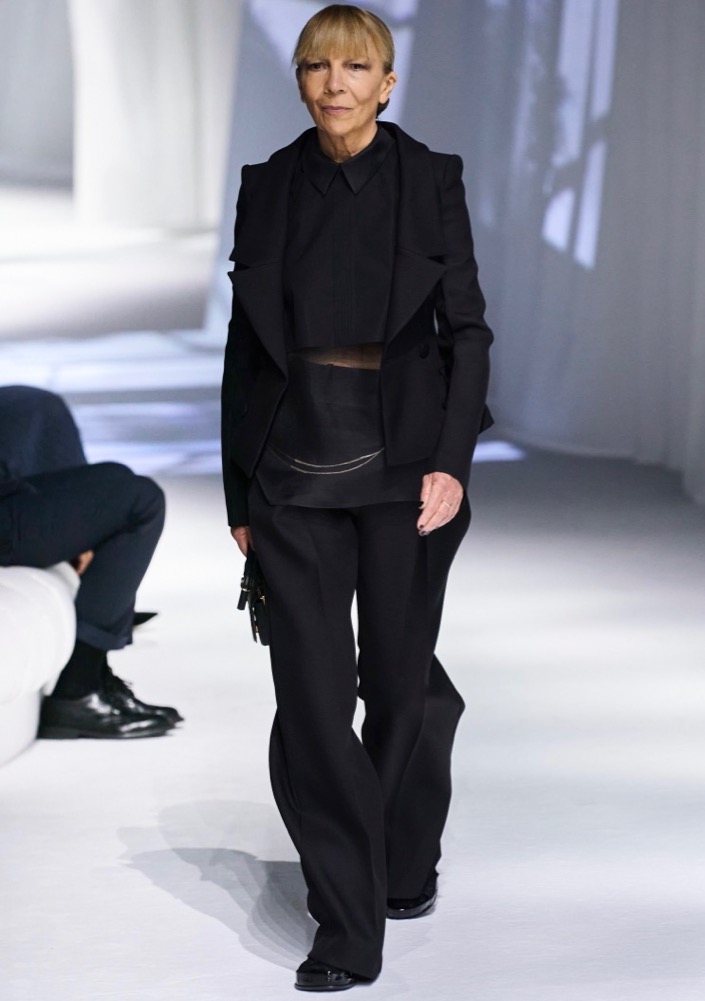
Sadly, only four of the month’s 32 appearances were women of color. And they all appeared in Paris.
MOST AND LEAST DIVERSE SHOWS
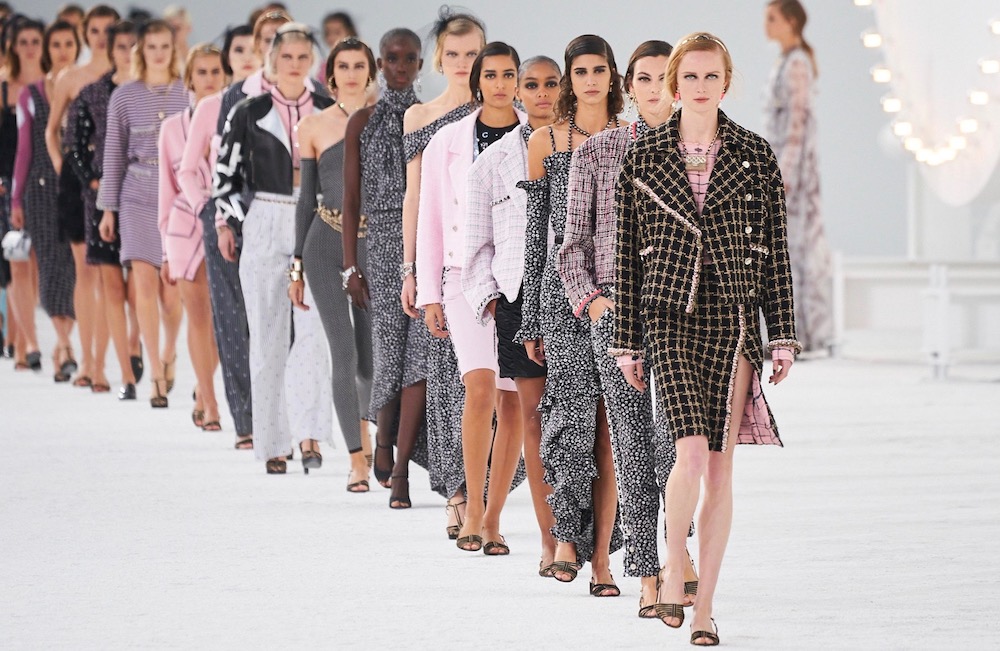
It’s a little tricky to crown the most and least diverse shows this season. Thanks to the pandemic, lots of brands scaled things back and only hired a model or two, which skews the numbers.
In New York we were pleasantly surprised to see one of last season’s least diverse shows move into the most diverse category. Cinq à Sept went from 24 percent for Fall 2020 to 100 percent for Spring 2021. Others reaching the 100 percent diversity mark include Adeam, Thakoon, Pamella Roland, Zero + Maria Cornejo, Bibhu Mohapatra, Chromat and Tomo Koizumi. With Thakoon, Pamella Roland and Zero + Maria Cornejo each only booking one model.
London’s “winners” were Fashion East with 100 percent (six out of six models of color), Osman with 100 percent (three out of three models of color), Toga with 100 percent (two out of two models of color), Halpern with 100 percent (one out of one models of color) and Richard Malone with 100 percent (one out of one models of color).
Over in Milan, Gabriele Colangelo hired two out of two models of color for 100 percent and Ermanno Scervino got to the 100 percent mark with one model of color.
Kenneth Ize topped the most diverse list in Paris with 100 percent (four out of four models of color). Nina Ricci and Uma Wang were also at 100 percent thanks to casting two out of two models of color.
When it comes to the least diverse shows, Snow Xue Gao, Marina Moscone, Claudia Li, Bevza, Libertine, Dennis Basso, Nicholas K and Katie Gallagher opted for zero models of color in New York. London’s Paul Smith, Sharon Wauchob, Phoebe English and Jenny Packham all hit 0 percent by each casting one white model. Milan had many 0 percent models of color contenders. Arthur Arbesser, Giada and Dsquared2 all cast two white models. Emilio Pucci, Les Copains, Krizia, Vivetta and Dundas opted for one white model. Paris was also full of brands that hit the 0 percent mark. Maison Margiela enlisted zero models of color out of five; Vivienne Westwood and Leonard hired zero models of color out of three. Olivier Theyskens, Barbara Bui, Alexis Mabille, Valentin Yudashkin, Ellery, Emanuel Ungaro and Zadig & Voltaire decided on one white model.
We also want to point out that both Dolce & Gabbana and Chanel didn’t do too well when it came to racial diversity. The Italian brand only came in at 19 percent with just 19 models of color appearances out of 98. Chanel was also at 19 percent thanks to just 13 nonwhite appearances out of 70. If you’re thinking these numbers are so low due to the high number of models cast, we’d like to direct your attention to Christian Dior. Out of 75 model appearances 28 of those belong to models of color for a more respectable 37 percent.
In closing, it’s important to keep the pandemic in mind when assessing our findings. With that being said, many brands could have tried harder to include models of color in their Spring 2021 lineups. While it’s great to see the racial diversity rate swinging back upward, the fact that it still falls short of Spring 2020 has us concerned. We’re hoping that numbers continue to increase as we move forward in every single category.
Additional reporting by Mark E.
Only women and non-binary models are included in this data. Models of color are categorized as those who are nonwhite or of mixed backgrounds.
